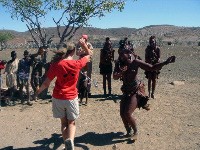The more than 1,300 pictures in Jacy Gentry’s scrapbook reveal sunbathing cheetahs, wind-sculpted sand dunes, and sunsets that bleed orange and pink. But it is only a small peek into a world that blurs the line between nature and civilization.
A Rhodes College junior from Collierville, Gentry was among nine biology students who participated in an environmental field study in Namibia from May 16th to June 6th. The excursion was a “Maymester,” Rhodes’ intensive summer program in which students earn credit hours by hands-on learning in a foreign country.
In this case, the biology students were studying wildlife preservation. Because the population of Namibia is only about 1.8 million people and the country is equivalent in size to France, wildlife is abundant.
Biology professor Rosanna Cappellato, who has led the Maymester to Namibia for the last three years, taught the spring 2007 class that was a prerequisite to the trip.
“There is incredible space,” said Cappellato, “and something about the country makes you feel good.”
A guide accompanied the group to such wildlife sites as Etosha National Park, the Elephant Human Relations Association, and the Cape Cross Seal Reserve, home to 150,000 seals.
 Patrick Deveau
Patrick Deveau
Jacy Gentry dances with a Himba woman while children look on.
The group also visited AfriCat, a non-profit organization that protects carnivorous animals, especially cheetahs and leopards. In Namibia, cheetahs number 2,000 — more than any other African country — and the students could track the animals on foot. Several of the cheetahs wore special collars that allowed the students to remotely monitor their movements.
But an especially memorable part of the trip for Gentry was meeting the Himbas. The Himba men were away from the village, but the women took the students inside their huts and then performed a dance outside as their children looked on.
“The kids were adorable,” said Gentry. “They would hang on to me, grab my legs, hold my hands, and not let go.”
Though the students were an ocean away from the United States, Gentry felt at home in the environment. Likewise, some of that environment felt at home with the students.
“One time, two troops of baboons broke into our bungalow and raided our kitchen,” Gentry said, laughing. “Afterward, we found a big pile of trash behind the bungalows.”
Upon their return to the States, the students began writing research papers based on their trip, and Cappellato hopes some will be published. For Gentry, the trip further fueled her desire to study biology and wildlife preservation. “It taught me how important it is to preserve what you have while you still have it,” she said, “because once you go so far one way, you can’t go back.”